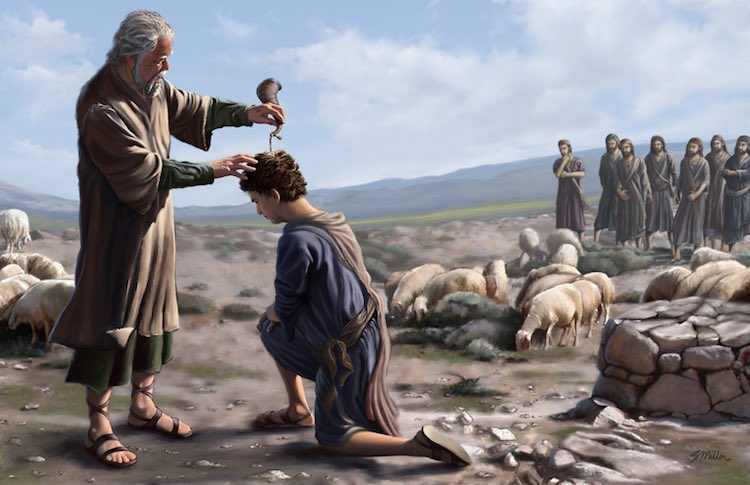Judaism is a combination of biblical commands and rabbinical traditions that have been the source of cultural identity to mark the Jewish people wherever they have sojourned in this world. It is vital to understand how the Bible and Jewish tradition work together in order to fully understand the Jewish perspective. In this week’s Torah Portion there is a supplement to the regular reading from the Torah in order to coordinate with the Hebrew calendar and the celebration of Purim.
Shabbat Zachor
According to the Gregorian calendar, we are living in the year 2017. According to the Hebrew calendar we are living in the year 5777 and we are currently in the month of Adar. The Hebrew month of Adar began on February 27th and ends on March 27th. During the Hebrew month of Adar, each Sabbath has a special name with a particular focus in Judaism. This particular Sabbath, March 11th, is called “שבת זכור” – “Shabbat Zachor” – “The Sabbath of Remembrance.” Shabbat Zachor always precedes the celebration of Purim, which will be observed this year on March 12th, 2017.
On this Sabbath, “Shabbat Zachor” – “The Sabbath of Remembrance,” we are to remember the command of God concerning the total destruction of the Amalekites:
Remember what Amalek did to you along the way when you came out from Egypt, how he met you along the way and attacked among you all the stragglers at your rear when you were faint and weary; and he did not fear God. Therefore it shall come about when the LORD your God has given you rest from all your surrounding enemies, in the land which the LORD your God gives you as an inheritance to possess, you shall blot out the memory of Amalek from under heaven; you must not forget. – Deut. 25:17-19
Amalek had attacked Israel unnecessarily after Israel had been freed from Egypt and were making their way to the Promised Land (Ex. 17:14). God commanded Israel to remember (“זכור” – “zachor”) this act of Amalek and to completely destroy the Amalekites once they were settled in the Land of Israel.

The Commissioning of Saul
It was approximately four hundred years later that the LORD gave the order to destroy Amalek through the prophet Samuel. It occurred during the reign of King Saul:
Then Samuel said to Saul, “The LORD sent me to anoint you as king over His people, over Israel; now therefore, listen to the words of the LORD. Thus says the LORD of hosts, ‘I will punish Amalek for what he did to Israel, how he set himself against him on the way while he was coming up from Egypt. Now go and strike Amalek and utterly destroy all that he has, and do not spare him; but put to death both man and woman, child and infant, ox and sheep, camel and donkey.’” – 1 Samuel 15:1-3
The Kingdom of Israel was now established under King Saul and it was time to bring the retribution of the LORD upon the Amalekites. God specifically commanded King Saul through his prophet Samuel to utterly destroy them and to leave no survivors, human or animal.
The Disobedience of Saul
King Saul gathered together 210,000 men from all of Israel and Judah and they set out together to destroy the Amalekites, however, King Saul failed to execute God’s command as he was ordered:
But Saul and the people spared Agag and the best of the sheep, the oxen, the fatlings, the lambs, and all that was good, and were not willing to destroy them utterly; but everything despised and worthless, that they utterly destroyed. – 1 Samuel 15:9
King Saul and the people of Israel spared Agag, the king of Amalek, and all of the best of the animals. God had given King Saul a specific command to carryout but he chose instead to disobey the Word of the LORD.
Samuel the prophet confronted King Saul regarding his direct disobedience to the Word of God but instead of admitting his sin, King Saul tried to rationalize his behavior (1Samuel 15:13-15). King Saul failed to fulfill the command of God and, as a result, God rejected him from being King of Israel. For a more complete study on the ramifications of King Saul’s actions, I recommend the following commentary: Confession
The Anointing of a New King
The disobedience of King Saul literally sealed his fate of being rejected as King of Israel. After this incident with King Saul, the LORD sent Samuel to anoint David, the son of Jesse of Bethlehem, to be king in Saul’s place (1 Samuel 16). During the ensuing years, Saul continued to reign as king, however, it was David who was the honored hero of the people in battle.
There was a period of some 10-15 years after David was anointed to be king by Samuel but before he was actually crowned as king. During this time period, Saul continued to reign as king of Israel and a very tenuous relationship existed between King Saul and David. King Saul was jealous of David and as a result, he sought to kill David, as we read in the biblical account: “Saul hurled the spear for he thought, ‘I will pin David to the wall.’ But David escaped from his presence twice” (1 Samuel 18:11). David resisted any temptation to kill King Saul in retaliation and believed that God would eventually make all things right.

The Providence of God
The providential events that surrounded King’s Saul’s death and David’s rise to the throne give evidence that God did truly bring about justice for David in the end. The situation played out as follows.
The Philistines gathered together for battle against Israel and at that time David had found protection under a certain Philistine king, Achish King of Gath (1 Samuel 27). David had volunteered he and his men to go to war with the Philistines against Israel, however, the other Philistine kings didn’t trust David and made them go back. So David and his men returned to Ziklag, the city where they had been living, while the Philistines went to Jezreel to make war with King Saul and all of Israel (1 Samuel 29).
When David and his men returned to Ziklag they were greeted by a very unhappy surprise, their city had been invaded:
Then it happened when David and his men came to Ziklag on the third day, that the Amalekites had made a raid on the Negev and on Ziklag, and had overthrown Ziklag and burned it with fire; and they took captive the women and all who were in it, both small and great, without killing anyone, and carried them off and went their way. When David and his men came to the city, behold, it was burned with fire, and their wives and their sons and their daughters had been taken captive. Then David and the people who were with him lifted their voices and wept until there was no strength in them to weep. – 1 Samuel 30:1-4
David and his men were completely broken by this raid against their families. They could only imagine that all that they had, including those who were most precious to them, were either killed or enslaved. They wept and they wept until they had no more strength.
David and all of his men were completely undone by this tragedy. Where could they turn? To whom could they turn? The Israelites were under the command of King Saul, who wanted to kill David. The Philistines had just sent David and his men away. And now the Amalekites had attacked them. To make matters worse, David’s own men began to turn on him:
Moreover David was greatly distressed because the people spoke of stoning him, for all the people were embittered, each one because of his sons and his daughters. But David strengthened himself in the LORD his God. – 1 Samuel 30:6
David was hard pressed on every side, however, it was in this place of absolute brokenness and rejection that David strengthened himself in the LORD.
Finding Strength in the LORD
David had trusted God up to this point in his life and he knew that God had anointed him to be king of Israel. He wasn’t ready to give up and he knew that the LORD must have had a plan in all of this. It was at this very low point in David’s life that he literally found his strength in the LORD and sought the LORD afresh:
Then David said to Abiathar the priest, the son of Ahimelech, “Please bring me the ephod.” So Abiathar brought the ephod to David. David inquired of the LORD, saying, “Shall I pursue this band? Shall I overtake them?” And He said to him, “Pursue, for you will surely overtake them, and you will surely rescue all.” – 1 Samuel 30:7-8
David sought the LORD and the LORD clearly answered David.
As illustrated in the life of David, we need to find our strength in the LORD and we need to continually seek His face, especially when we have no where else to turn. Yeshua taught us, “Ask, and it will be given to you; seek, and you will find; knock, and it will be opened to you.” (Matt. 7:7) God’s promises are real and they are true. We need to learn to continually seek Him, to listen carefully for His voice above the screams of the people around us, and to obey when He speaks. This will never be the popular path but it is the only true path to a successful life in God.

David received a clear word from the LORD and he wasted no time in fulfilling it. David took his six hundred men and pursued the Amalekites until they overtook them:
David slaughtered them from the twilight until the evening of the next day; and not a man of them escaped, except four hundred young men who rode on camels and fled. So David recovered all that the Amalekites had taken, and rescued his two wives. But nothing of theirs was missing, whether small or great, sons or daughters, spoil or anything that they had taken for themselves; David brought it all back. – 1 Samuel 30:17-19
David obeyed the word that he received from the LORD and the LORD fulfilled His promise to him by allowing him to recover all that had been taken.
The Amalekites
The irony of this biblical account is that it was the Amalekites who attacked and invaded the city of David and his men. These were the same people who were destined for destruction by the LORD, however, because King Saul failed to obey the decree of the LORD to completely annihilate them, they were left to attack the LORD’s newly anointed man, David, who was soon to be crowned king.
It was at the very same time that David and his men pursued the Amalekites that King Saul and the Israelites were fighting against the Philistines. King Saul was wounded in this battle against the Philistines and ended up trying to take his own life when he saw no hope to survive (1 Samuel 31:1-6). The Philistines found the body of King Saul on Mount Gilboa and pinned it to the wall of Bethshan (1 Samuel 31:8-10). The very thing that King Saul attempted to do to David by pinning him to the wall with the spear, happened to him.
One final providential link to these turn of events in both David and Saul’s lives is that it was an Amalekite who informed David that King Saul was dead:
The young man who told him said, “By chance I happened to be on Mount Gilboa, and behold, Saul was leaning on his spear. And behold, the chariots and the horsemen pursued him closely. When he looked behind him, he saw me and called to me. And I said, ‘Here I am.’ He said to me, ‘Who are you?’ And I answered him, ‘I am an Amalekite.’ Then he said to me, ‘Please stand beside me and kill me, for agony has seized me because my life still lingers in me.’ So I stood beside him and killed him, because I knew that he could not live after he had fallen. And I took the crown which was on his head and the bracelet which was on his arm, and I have brought them here to my lord.” – 2 Samuel 1:6-10
In the end, King Saul was killed by a descendant of the very people whom he was supposed to destroy. And the very same Amalekite who killed King Saul was used to inform David of what happened. David then ordered for this Amalekite to be struck down and killed for slaying the anointed of the LORD (2 Samuel 1:14-16).
An Uncompromising Lifestyle
We see a vast difference in the actions of Saul and David regarding how they lived their lives before God; Saul compromised the Word of the LORD in his life whereas David was steadfast and uncompromising toward the Word of the LORD. We know that David was not a perfect man, however, he was a man after God’s own heart and he lived a life that honored God above all else.
During this traditional observance of “Shabbat Zachor” – “The Sabbath of Remembrance,” let us remember that the Word of the LORD endures forever. Four hundred years had passed from the time that the LORD had declared that the Amalekites were to be destroyed until the decree was given to King Saul to carry it out. Every Word of the LORD is to have it’s fulfillment. King Saul compromised the Word of the LORD and sought to establish his own standard in its place. King David sought the LORD with a whole heart and lived an uncompromising life.

The final chapter regarding the Amalekites is written in the book of Esther. The notorious villain in the book of Esther was a friend of the king who sought to destroy the Jews. His name was Haman and he was a descendant of Agag (Esther 3:1), the king of the Amalekites (1 Samuel 15:9). Thankfully, Queen Esther and her cousin Mordecai proved themselves to be uncompromising at that time by seeking the LORD in fasting and prayer. Through yet another set of providential events, the LORD brought an end to Haman and to his evil plot to destroy the Jewish people. The Festival of Purim remembers this event and will be celebrated on Sunday, March 12, 2017.
No Compromise
Through the lives of Kind David, Queen Esther, and Mordecai the Jew we have records of two men and a woman who modeled lives of no compromise. Each one trusted in God and rose above the enemy who sought to destroy them. Now more than ever before we need to live lives that are modeled after heroes of the faith. Let us shine brightly in this world and live a life of “No Compromise!”
Shabbat Shalom – We welcome your comments below!
If you enjoyed reading this article, share it today with friends! We also invite you to sign up for our weekly Torah Portion commentary on the sidebar to the right.
Help keep our weekly commentaries free and available to all. Click here to donate today:
Torah Portion: Ex. 27:20 – Ex. 30:10
Haftara: Ezekiel 43:10-27 – 1 Kings 6:13
Shabbat Zachor: 1 Samuel 15:2-34
Maftir: Deut. 25:17-19
Return to Torah Portion Homepage
Copyright Jewels of Judaism. All rights reserved 2017



Dear Daniel,
Greetings in Yeshua HaMaschaich!
Thank you for illuminating the various scriptural connections between Saul of the tribe of Benjamin and the son of Kish, who permitted Agag, the Amalekite king, to live, which ultimately resulted in his progeny the wicked Haman the Agagite authoring the Persian decree to exterminate the Jews, in contrast to Mordecai and Esther, from the tribe of Benjamin and descendants of Kish and Shimei, to be in position to foil Haman’s wicked plot and bring about Haman’s execution. Praise the Providence of Elohim!
I also find it quite interesting that Mordecai was a descendant of Shimei, whom David had mercifully permitted to remain alive, after he had repeatedly cursed David during Absalom’s rebellion. Had David killed Shimei, then Mordecai and Esther might never have been born and, consequently, they might not have been in position to save the Jewish people.
Moreover, I humbly thank the LORD for using sinners like Mordecai and Esther, who I believe had compromised by remaining in the relative comforts of Susa rather than returning and rebuilding Jerusalem and Judah, and us, to accomplish all His perfect purposes. And in His amazing grace, the LORD truly “causes all things to work together for good to those who love God, to those who are called according to His purpose” (Romans 8:28). That includes Esther’s virtual sex slavery, in spite of the fact that Xerxes had elevated her to queen. But, that put her in the position to save the Jews! Hallelujah, what a Savior!
Finally, each one of us must indeed not compromise with the wicked Hamans of our own day, including ISIS, Iran, and other Islamic militants, who actively seek to destroy Israel and the Jews, as well as the United States and the rest of Western civilization. Thank God that His will shall prevail! May we each abide in Him and His truth, as He has revealed to us in His Word and through His Son Yeshua HaMaschiach!
Isaiah 46:9-10 New American Standard Bible (NASB)
9 “Remember the former things long past,
For I am God, and there is no other;
I am God, and there is no one like Me,
10 Declaring the end from the beginning,
And from ancient times things which have not been done,
Saying, ‘My purpose will be established,
And I will accomplish all My good pleasure’;
Much Shalom,
Sal:-)
Such a fitting theme for me, as I was fasting these last three days a meal for a specific request. Well, Jesus said: “Ask, and it will be given to you; seek, and you will find; knock, and it will be opened to you.” Amen! Thank you Daniel!
Blessings!